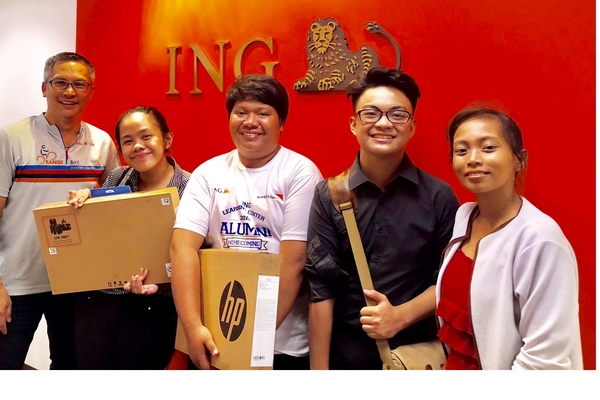
Child leaders of ING Learning Center in Tondo receive brand-new laptops from Dutch financial institution ING Bank after winning in a three-month entrepreneurship competition dubbed “Build a Business.” In the photo are Dom Gavino (left), ING Bank chief finance officer and head of ING Foundation, and the three winning teams of ILC child leaders.
contributed photo
Build a Business’ game makes entrepreneurs out of ING Learning Center’s child leaders.
It’s never too early to start learning how to stay a step ahead in life and in business. This was what a group of children from an impoverished coastal Manila community of Tondo realized after turning P2,000 in seed capital into lucrative profit.
These young entrepreneurs were honed as “child leaders” in the ING Learning Center (ILC) of Dutch financial institution ING Bank.
Since it started in 2005, the ILC has been supporting children living in Baseco compound, Tondo through regular tutorial lessons in math, English, and reading by ING Bank employee volunteers and World Vision.
The learners are also transformed into young leaders by actively participating in village-based child welfare activities and tutoring younger kids. ING also offers high school or college scholarships, which covers full tuition, book expenses, uniforms, transportation, and other allowances, to deserving child leaders.
“Our purpose at ILC is to raise a generation of winners and go-getters in school and life, and to keep the cycle of inspiration and hard work in the children’s studies despite all the odds,” said Dom Gavino, chief administrative officer of ING Bank, N.V., Manila Branch and treasurer of the ING Foundation, the bank’s Philippine social responsibility arm.
In May 2018, the Dutch bank held an entrepreneurship competition dubbed “Build a Business” where ILC child leaders were paired up and worked with their teachers and ING employee volunteers to design and market their products.
The contest was the culmination of a three-month financial literacy training which started in March 2018 to coincide with ING Bank’s Global Money Week, an annual financial awareness campaign that seeks to inspire young people to excel in money matters.
After being trained by ING’s in-house finance and accounting experts, three teams of ILC child leaders emerged as winners and were rewarded with brand-new laptops, enabling the child leaders to see a possible avenue for livelihood.
Evelyn and Schyler posted the highest profit of P14,500 after selling snacks and assorted food items in their local communities and to customers online.
Second placers Rommel and Nicole, as well as third placers Cass and Angel, earned P9,000 and P8,400, respectively, from their food ventures, including pre-packed chips, banana fritters, and homemade beverages.
“Honestly, their profit levels were unexpected. It was a testament to their resourcefulness and to how hard they worked. I am sure that they even surprised themselves and many realized the power they had to steer their own futures. Exercises like this one also show us that these kids have grown so much in confidence, presentation skills, and capability,” said ING Credit Officer Reuben Estrada, who leads the project.
Entrepreneurship takes on greater importance in a country like the Philippines where most remain unbanked and lack knowledge in investing. Micro, small and medium enterprises (MSMEs) make up 99 percent of total business in the country.
Eighty-nine percent of these are micro businesses, which represent a ray of light for poverty-stricken sectors of society and emphasize the need to develop financial literacy in the population at a young age.
“It’s aligned with our general belief that today’s children and youth should become empowered economic citizens who have a solid grasp of the importance of saving and investing for the future. This creates a positive wave that will carry over to their families and entire communities,” Estrada said.